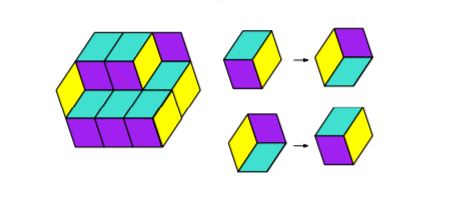The Markov chain picks one hexagon consisting of all three types of rhombi uniformly at random and flips it as is shown in the right-hand side of the figure. This is a finite-state Markov chain.
Show that this Markov chain is irreducible.
The question does not ask for precise mathematical expression.
My idea: W.L.O.G. the original tilings of a hexagon have three cases denoted by $\{1, 2, 3\}$ which the probability of each one is $1/3$. Then after flipping each one, we get three new tilings denoted by $4, 5, 6$ where state $4$ got from flipping the state $1$ and $5$ got from $2$, $3$ got from $6$. So there are two elements of the state space is $\{1, 2, 3, 4, 5, 6\}$.
It is clear that state $1, 4$ communicate each other by flipping the state $1$ or $4$. Similar with $2, 5$ and $3, 6$. But how to get the $2$ from the other states except for $5$
Is there any idea? Thanks!

